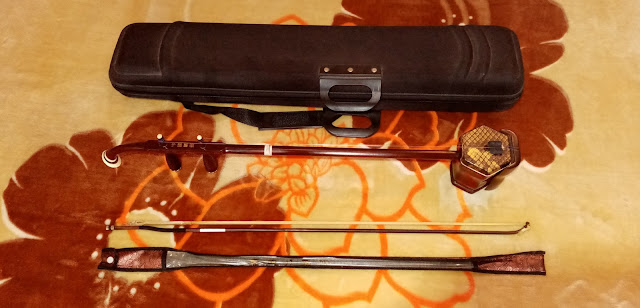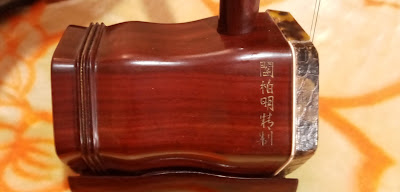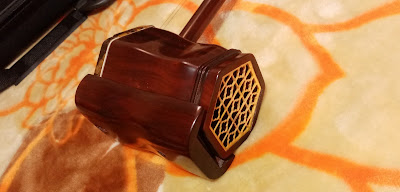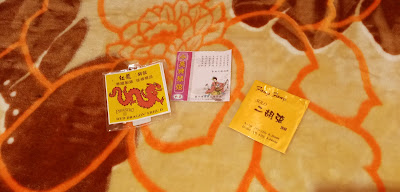二胡. Erhu. Significa “dos cuerdas”.
Instrumento de cuerda frotada. Los instrumentos de cuerda frotada son frotados por un arco con crines con resina, donde por fricción, suena el sonido. La caja de resonancia de este instrumento es muy pequeña, y tiene piel de serpiente real. No tiene trastes.
Afinación estándar en la-re.
Fecha de compra en Octubre 16, 2014.
De madera de sándalo y piel de pitón.
Hecho a mano. En la caja de resonancia aparece tallado 閻柏明精制. Significa “Hecho por Yan-Bo-Ming (閻柏明 significa Yan-Bo-Ming)”. Su lugar de procedencia es Wujiang, Suzhou, China.
La piel de pitón probablemente es de Python bivittatus, o Pitón de Birmania (Myanmar).
La primera vez que escuché este instrumento fue gracias a un set de instrumentos virtuales de instrumentos tradicionales chinos, que utilicé en Dreamlands por primera vez. Entonces busqué por el instrumento real y su sonido real, y me enamoré al instante. Deseaba tener ese instrumento, y ahora se ha convertido en mi instrumento más querido.
El erhu tiene una gran inscripción escrita en Chino Antiguo. El poema se llama 山居秋暝 (Anochecer otoñal en mi cabaña de la montaña; Atardecer de otoño en la montaña) y es de 王维 (Wang Wei)
山居秋暝, 王维
空山新雨后,天气晚来秋。
明月松间照,清泉石上流。
竹喧归浣女,莲动下渔舟。
随意春芳歇,王孙自可留。
Atardecer de Otoño en la Montaña, Wang Wei
Wang Wei pertenece al siglo VII, de la Dinastía Tang.
La frase del erhu es 明月松间照,清泉石上流, que significa “la luna brilla entre pinos, y un manantial cristalino corre encima de las piedras”.
Otras Inscripciones
La inscripción en Chino Antiguo 中國蘇州 significa “Suzhou, China”.
La inscripción en chino 紫檀精品 significa “Madera de Sándalo de Lujo”.
La funda del arco tiene un texto en chino que dice 精品二胡弓, y significa “Arco de Erhu de Lujo”.
Acerca de los papeles de procedencia, en el ticket, lo más importante es 檀木专业二胡 蟒蛇皮, que significa “Erhu Profesional de Madera de Sándalo y Piel de Pitón”.
En la tarjeta de negocio, pone la dirección.
La dirección dice 吴江經濟技術開發區同谷百貨商行, que significa “Grandes Almacenes Tonggu de la Zona de Desarrollo Económico y Tecnológico de Wujiang”, con dirección exacta en 吴江經濟技術開發區運東大道1088號, que significa “No. 1088, Avenida Yundong, Zona de Desarrollo Económico y Tecnológico de Wujiang”.
Finalmente, una búsqueda poniendo 閻柏明 二胡 “Yan-Bo-Ming Erhu” me lleva a esta página: http://www.ki-kaiha.com/shop_d.htm
Erhu
二胡. Erhu. It means “two strings”
Bowed strings instrument. The bowed string instruments are rubbed by a bow with horsehair and resin where by friction, sound the sounds. The soundboard of this instrument is very small, and has real snake skin. It has no frets.
Standard Tuning in la-re.
Purchase date in October 16, 2014.
Made of sandalwood and python skin.
Handmade. In the soundboard appears carved 閻柏明精制. It means “Made by Yan-Bo-Ming (閻柏明 means Yan-Bo-Ming)”. It comes from Wujiang, Suzhou, China.
The python skin is probaby by Python bivittatus, or Burmese Python (Myanmar).
The first time I listened to this instrument was thanks to a set of virtual instruments of traditional chinese instruments, that I used in Dreamlands for first time. Then I searched for the real instrument and its real sound, and I fell in love instantanely. I desired to have this instrument, and now it has become my dearest instrument.


Inscription
山居秋暝, 王维
空山新雨后,天气晚来秋。
明月松间照,清泉石上流。
竹喧归浣女,莲动下渔舟。
随意春芳歇,王孙自可留。
The sky and the air an autumn eve set in.
The bright moon upon the pine glade illumines,
And clear creek over the rocks frolics.
Bamboos sound, the washing girls are homebound;
Lotus stirs, a fishing boat downstream found.
Even though spring leaves and blooms are nowhere,
As such, noble ones like me can sure stay here.
Wang Wei belongs to the VI century, the Tang Dynasty.
The sentence of the erhu is 明月松间照,清泉石上流, meaning "the bright moon upon the pine glade illumines, And clear creek over the rocks frolics”.
Other Inscriptions
The inscription in Ancient Chinese 中國蘇州 means “Suzhou, China”.
The inscription in chinese 紫檀精品 means “Sandalwood of Luxury”.
The bow cover has a text in chinese that says 精品二胡弓, and means “Erhu Bow of Luxury”.
About the papers of procedence, in the ticket, the most important is 檀木专业二胡 蟒蛇皮, that means “Sandalwood Professional Erhu Python Skin”.
In the business card, it says the address.
The address says 吴江經濟技術開發區同谷百貨商行, that means “Wujiang Economic and Technological Development Zone Tonggu Department Store”, with exact address in 吴江經濟技術開發區運東大道1088號, that means “No. 1088, Yundong Avenue, Wujiang Economic and Technological Development Zone”.
Finally, a search of 閻柏明 二胡 “Yan-Bo-Ming Erhu” takes me to this page: http://www.ki-kaiha.com/shop_d.htm





















